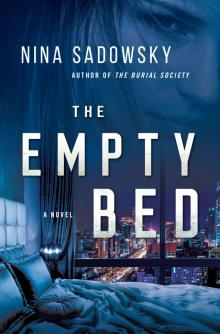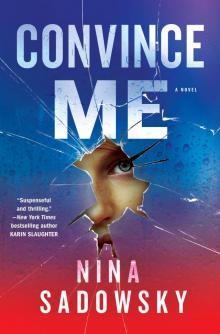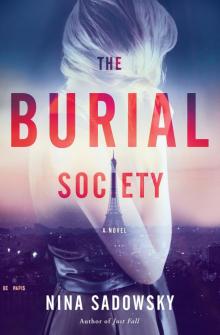- Home
- Nina Sadowsky
The Empty Bed
The Empty Bed Read online
The Empty Bed is a work of fiction. Names, characters, places, and incidents either are the product of the author’s imagination or are used fictitiously. Any resemblance to actual persons, living or dead, events, or locales is entirely coincidental.
Copyright © 2020 by Nina Sadowsky
All rights reserved.
Published in the United States by Ballantine Books, an imprint of Random House, a division of Penguin Random House LLC, New York.
BALLANTINE and the HOUSE colophon are registered trademarks of Penguin Random House LLC.
Hardback ISBN 9780525619871
Ebook ISBN 9780525619888
randomhousebooks.com
Title-page image: © iStockphoto.com
Book design by Dana Leigh Blanchette, adapted for ebook
Cover design: Eileen Carey
Cover images: (Woman) SPL Images/Getty Images; (City) Sino Images/Getty Images
v5.4
ep
Contents
Cover
Title Page
Copyright
How Things Begin...
Rising
Leavings
Only Friend
Reservations
Agitation
Drugs and Money
Instigation
Jet Lag
Frustration
Needles and Pins
The Empty Bed
While Peter Was Sleeping…
Rich People Problems
Diesel Fumes
Reunions and Introductions
A Hard Ask
Annual Number of Deaths
Points for Attitude
Ring of Truth
Hollow Suits
Sticky Fingers
Out
While Peter Was Still Sleeping…
The Other Half
Smack!
Shanghai Street
Troubles
While Peter Was Still Sleeping…
Bound
While Peter Was Still Sleeping…
Colonial Gem
Tracks
Pinch
Truth or Dare
Dizzying Heights
Skills
Stranger
Rustle
Respect
Reunion
A Report
Dark Heart
Taken
Guilt
Mist
Divide to Conquer
The Play
Victory
Wings
Flight
Adrift
Flirt
Gold Star
Match
Baggage
Trolling
The Benefits of Invisibility
Perfect
Wild
Mad World
Loose Ends
Linger
Gone
Dedication
Acknowledgments
By Nina Sadowsky
About the Author
How things begin…
I could tell the story differently; of course I could. Every storyteller twists his or her lens to suit an agenda. Or protect the heart.
This impulse to shape the truth is universal, one of the many traits that serve to remind us that we are more alike than we are different.
I find it useful to focus on where we align even as our differences threaten to tear us apart. After all, in order to do what I do, you have to not just learn to see the world through others’ eyes, but to live, to breathe, to act, to be another.
Welcome to the Burial Society. Peer into the lens and see what I see.
RISING
Catherine,
Phoenix, Arizona
I shut the door of my rental van but don’t lock it. It’s not only that I don’t fear it will be stolen in this exclusive neighborhood; it’s that we will need to make a fast exit. The COMPUTER GEEQUE decals I’ve slapped on its side panels are eye-catching and distinctive (what any witness will remember)—and easily disposable.
The sunbaked asphalt is spongy under the hard soles of my boots. The air is dry as bleached bones, hot and still. The sun, relentless and blinding, hangs directly overhead in a serene blue sky free of any clouds.
I open the passenger door to let Stephanie out and make a mental note to talk to her later about some refinements in her appearance. In her usual uniform of skintight shredded black jeans, rock ’n’ roll T-shirt, and leather jacket, bright blue eyes rimmed with kohl, she stands out here in the Arizona suburbs. You can take the girl out of Jersey, but still, she needs to learn to blend in.
I’m also worried she might pass out from the heat in that leather jacket and, purely selfishly, that’s the last thing I need right now.
Holding up one hand to signal she should stay put, I pull out a pale pink polo shirt that matches my own and toss it to her.
“Lose the jacket. Put this over your T-shirt.”
She complies. It’s time to move.
The villa we are targeting sits in a cul-de-sac in a pricey community anchored around a golf course and also featuring a clubhouse, tennis courts, and swimming pools. The monochromatic soft beiges and muted greens of true sunbaked desert should color the landscape here, so the deceptive emerald of the man-made lawns and rolling hills of the golf course give this development a disingenuous feel, temporary, like it could be just a stage set, struck at any moment.
Despite this, the harsh sun reminds us where we really are.
It’s why we came at noon; everyone is inside, shades drawn against the blazing sun, air conditioners pumping.
We have a cover story ready if we’re stopped, of course, but I’d prefer it if we just slid in and out without anyone noticing. My plan is to get inside her house and then get Leslie Virgenes out of there as quickly and cleanly as possible. If she’s there. If not, I’ll have to improvise.
We steal across the lawn and past a silver Audi TTS Coupe parked in the driveway of the “Spanish-inspired” villa, a good first sign. We turn the corner and edge along the house to the back door. We did a trial run last night at a sister complex across the road built by the same developer. Under Stephanie’s expert tutelage, I picked three kitchen-door locks to get my rhythm down, each one taking progressively less time. Stephanie may need refinements in certain areas, but she has skills and is willing to teach them.
Stephanie joined the Burial Society seventeen months ago. Like most of my recruits, she was a rescue in whom I saw potential. (Her stories, along with those of my other recruits, are tales for another time.)
We snap on latex gloves. I conquer Leslie’s lock in less than twenty seconds. As the tumbler clicks over, Stephanie gives me a pleased grin, a teacher proud of her pupil.
We’re in. Steph closes the door softly behind us and lifts her shaggy mane of black hair away from her damp neck. The sweat on my skin prickles with chill in a matter of seconds. The powerful hum of the central air system swallows up most sound.
A cup of cold coffee with a congealed ring of cream sits on the gray granite countertop, next to a half-finished piece of toast smeared with peanut butter. A fat fly buzzes lazily over a bowl filled with overripe bananas and a net bag o
f tangerines. A smaller bowl next to it holds a set of keys. A fob for an Audi is a probable match for the car parked in the driveway.
I extract two loaded syringes of fentanyl from their pouch in the leather satchel strung across my body and hand one to Stephanie. I head through the kitchen into the dining room. Stephanie follows, but then we split paths, she heading toward the front office, den, and main living area, me toward the bedrooms. We’ve studied the floor plans together, role-played every possible scenario: finding Leslie alone, with her son. Possibly armed. Almost certainly irrational from fear. If Leslie’s even still here. My current guess is yes, given the evidence of the car in the driveway and the keys and food in the kitchen.
There will be three bedrooms along this corridor. The first door hangs ajar. The room is tidy and a bit sterile: a guest bedroom. The second door is closed and I push it open. Leslie’s son’s room, cluttered with sports trophies and posters; the faint aroma of teenage hormones and perspiration discernible even in the chilly air. The room looks like it hasn’t been used in a while. A lone striped tube sock sits on the end of the neatly made bed, but otherwise it’s tidy, a bit dusty. I’m relieved; the kid is supposed to be away at college (a sophomore playing for the Arizona Wildcats) and it makes my job simpler if he’s where he ought to be, someone else dispatched there to ensure he’s safe.
The door to the master bedroom is half open, a spill of golden light playing across the russet tile floor of the hallway. I walk toward and then into the light, pushing the door fully open. I enter Leslie Virgenes’s private domain, a tastefully and luxuriously appointed master bedroom and bath, the showpiece of the trophy second home she purchased at the pinnacle of her successful career in the pharmaceutical business.
A California king-sized bed with an expensive-looking cream-colored headboard of tufted raw silk dominates the space. The sheets, comforter, and mounds of pillows on the bed coordinate in feminine waves of flowers, all rosy pinks and soft golds except where the stain from her loosened bowels darkens their hue, a foul side result of asphyxiation. A plastic bag is ruthlessly snugged around her head.
* * *
—
My hand flies to my mouth as I fight the sour wash rising up in my throat and the sting in my eyes. We’re too late. I back away. They’ve found her. Killed her. There’s no more I can do here. There’s no reason to stay.
But it means others I need to protect are in terrible danger.
I swiftly make my way back toward the center of the house. I find Stephanie coming in my direction.
“Nobody,” she reports softly. “But the front-door lock was jimmied open. Clean job.”
“She’s here,” I say. “Dead. Poor thing. Didn’t think they’d look in her own home?”
The question is rhetorical. I’d tried to help Leslie before she came here, but people don’t always listen to reason. Particularly when they’re terrified.
“What now?” Stephanie asks.
“We’re out of here.”
Steph hands me her syringe, and I carefully slip both of them back into their pouch and then into my satchel; we had them ready to drug Leslie only if she wasn’t willing to come quietly. We were here to protect her, but she wouldn’t have known that.
A framed photograph of Leslie and her son snags my eye. Arms around each other’s shoulders. Smiling faces. The same crinkly brown eyes. He was a sperm donor baby; Leslie the only parent in his life. I suppress the rush of empathetic grief I feel for Leslie’s teenage boy. We need to get out of here quick and clean.
If they found Leslie, have they found us too?
We slip out of the back of the villa just the way we came, our shoes tapping softly across the Mexican tiles. I pause and scan the empty blandness of the community before we make our move. The heat seems even more oppressive than it did mere minutes ago; perhaps it’s the indelible image of Leslie Virgenes’s flattened, lifeless face tightly wound in unforgiving plastic. I’m glad I stopped Stephanie before she saw the body. She doesn’t need to carry that picture in her head.
I inhale a deep gulp of hot air. The community is quiet as a morgue, except for the angry drone of a lawn mower somewhere in the distance. I nod to Stephanie and we go, slipping quietly across the impossibly green grass, making a beeline for the van. I scan the street, my eyes searching for the telltale flick of a curtain, or a shadow crossing a window, but come up empty.
We climb inside the van and I turn a corner before stopping to quickly strip off the COMPUTER GEEQUE decals. As I hop back behind the wheel, a siren’s urgent wail pierces the silence.
I see the flashing cherries of the approaching patrol vehicle. I pull away from the curb slowly and calmly despite my racing heart. I feel in my bones that this is no coincidence. Someone wanted the cops to find us with Leslie’s corpse.
Stephanie’s eyes are wide; she may not suspect what I do about being set up, but she has enough experience of her own with the police to want to avoid another encounter.
As we pass the squad car, I dare a direct glance at the driver. I see a man, mid-twenties, perhaps, with a slightly doughy face, on which a pair of mirrored aviator sunglasses perch. A rookie, I think. Just a kid.
I’m glad I can’t see his eyes, the “before” picture of innocence that I imagine hides behind his shades. In a matter of moments, those eyes will be altered forever. The sight of the brutally murdered Leslie Virgenes will haunt him for the rest of his days.
In that we are united.
The things we cannot see…
These are the things that torment us, even more than the indelible images burned into our mind’s eye. The muffled thump on the other side of the wall, the distant scream, the squeal of brakes and crash of metal just outside our view. The things we can’t sort and name, evaluate and dissect, make sense of, put to bed.
They loom large, these things we cannot see, even more monstrous for their indistinct forms and blurry edges, for our ability to sketch in the sordid details with the most horrible imaginings.
LEAVINGS
Magali Guzman,
New York City
Special Agent Maggie Guzman jogs up the subway stairs and pulls her coat collar a little tighter against the fierce wind whipping through the wind tunnels of downtown Manhattan. She deftly navigates her way through the teeming morning crowds. Makes her way inside a jam-packed corner deli. Luis, the short, stout Puerto Rican guy behind the counter, lifts a bag with her order tucked inside as soon as she enters.
“Toasted sesame bagel butter black coffee,” Luis affirms in one breath as he hands her the package and she hands him a five-dollar bill.
“Gracias, Luis.” Maggie tucks the package under her arm and exits the deli, digging in her briefcase for her badge.
The Federal Building is cold steel, marble, and glass, austere, unwelcoming. But Maggie still feels a thrill every time she enters. She’s proud of her work and sometimes still can’t believe that the career she’s dreamt of since she was a little girl has come to pass.
She greets the security guard manning the employees’ side entrance by name and asks after his pregnant wife. As she inserts her SA badge into a turnstile and punches her personal code into the numbered panel, she and the guard chat about due dates and baby names. The glass turnstile slides open. Maggie’s sharp eyes take in every detail of the activity surrounding her, despite her friendly conversation with the guard. Her clear-eyed and relentless observation of the world around her is one of the things that make Maggie a good agent. Her supervisor said as much at her last review.
She exits the elevator on the twenty-second floor, flashes her credentials for the FBI cop on duty, and then again inserts her SA card into the security panel and presses the numbers of her personal code. As she makes her way down the hallway—lined with inspirational quotes from former FBI directors—to the squad area, she can hear Ryan Johnson’s voice booming.
What is that ass going on about this time?
“No, no, that’s not the way I heard it. It went down like this: Yes, she showed up at the bar dressed in a disguise and talked with a bunch of the UC instructors—and only revealed her identity the next morning at the first official day of training. But I also heard”—Ryan’s voice drops a notch—“that she flirted with all of them, laid it on really thick, and later blew Connors in the bathroom. That’s the real reason they took her.”
Maggie burns with a combination of shame, fury, and outrage. How dare he? She earned her spot in the undercover training program! Yes, showing up in full makeup, heels, and a sexy dress at the bar where the instructors were known to hang out the night before training began had been a risky stunt, but one that paid off in the end. She’d chatted them up, playing a role all the while. She still thrills to the memory of the slow smile that crawled over Special Agent Connors’s face after she morphed into the accent and character she had employed the night before when she’d declined his offer of a drink. She’d showed them she was daring, able to keep her cool, an innovator. But blow him? Never.
Maggie reminds herself to breathe. That she is leaving this office to start UC school in just a matter of weeks, while that prick Ryan Johnson will be staying behind. Twice he’d applied; rejected twice too.

 The Empty Bed
The Empty Bed Convince Me
Convince Me The Burial Society
The Burial Society